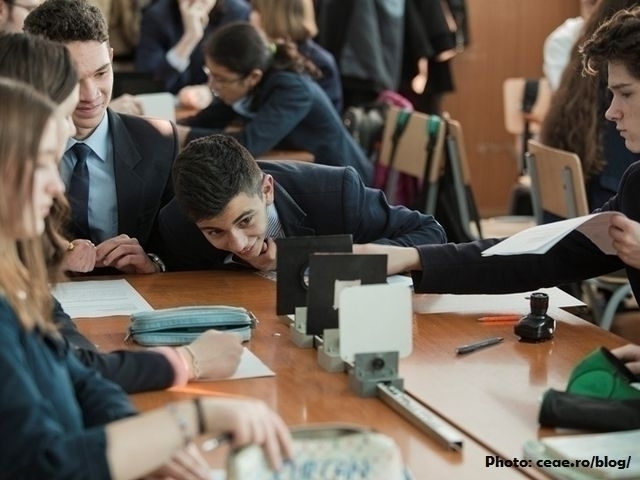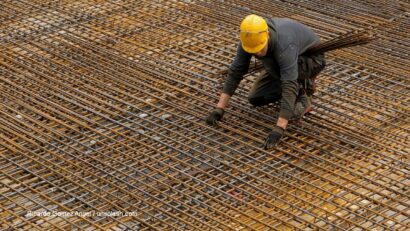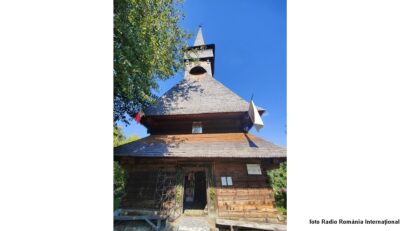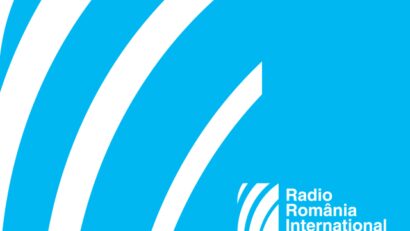Teenagers and School
Of late, growing attention has been paid to schools' capacity to stimulate certain skills and abilities in students, and not just foster knowledge.

Christine Leșcu, 22.02.2017, 13:34
Schools are no longer seen as just places
where students go to learn facts. The focus has started to turn to schools’
capacity to stimulate certain skills and abilities in students. Even the school’s
role in developing emotional intelligence has been tackled in recent years.
Emotional intelligence is manifested in connection with certain non-cognitive
abilities, which are worth having a place of their own in the school curricula.
This is the conclusion of a survey conducted by the Babes-Bolyai University in
Cluj-Napoca, western Romania, jointly with ROI Association and the Institute of
Education Sciences, with UNICEF sponsorship.
Here is Eduard Petrescu, member of the UNICEF office in Romania with more
on these non-cognitive abilities.
In
short, these are abilities that cannot be quantified by means of any standard
IQ or knowledge tests. Relevant for the education system are those concerning a
personal dimension. I am referring to the way in which, as a person, you manage
to get a certain type of insight, the way in which you can control or improve
certain types of behaviour, find motivation or use creativity. There is also a
social and community dimension: those abilities related to the capacity to
establish relationships or the sense of belonging to a group. There are also
civic abilities, those that allow you to join projects and the decision-making
process.
Given their individual and social dimension,
non-cognitive abilities are essential for the harmonious development of a
person and therefore they must be encouraged, especially in adolescence, when
personalities and characters are formed. For this reason, the survey on these
abilities covered teenagers, as the ROI Association Representative Simona
David-CrisbasaN told us.
During adolescence, physical and mental abilities are developing just
like in adults, whereas the emotional side lags a bit behind. And that’s why
teenagers tend to make all sorts of risky decisions in this period. These
social-emotional abilities have several dimensions: some of them are about
personal development, discipline, perseverance, self-confidence, initiative.
Others are about communicating with the others, establishing relations, about
resilience, stress resistance, about how they understand and express emotions.
There is also the civic-engagement component, more specifically the involvement
in various community projects and the sense of belonging to a community.
Experts have pointed out that, in
Romania, non-cognitive abilities are being developed only through
extra-curricular activities or activities held in schools as part of a week-long
programme entitled A Different Kind of School. In fact teenagers are more
comfortable when involved in volunteer programs than when carrying out the
standard school curricula activities. Researchers say this could be explained
by the fact that the Romanian educational system still focuses exclusively on
passing knowledge from teachers to pupils. How could teachers in schools
stimulate non-cognitive abilities and how could these, in their turn, help
pupils improve their school performance?
Simona David-Crisbăşan attempts an
answer:
It would be better if schools laid emphasis on these abilities, too, and not
only on the cognitive ones and on school performance, as it happens nowadays in
the educational system. Little importance is attached to communication,
personal relations and motivation, although paradoxically, everybody notices
that adolescents are not highly motivated or genuinely interested in school.
This could be explained by the fact that they do not feel like they are really
involved, and it is very important for adolescents to feel involved and to take
part in the educational process. In primary school, special emphasis is laid on
relationships and the way pupils relate to each other, as there is only one
teacher who takes care of the children for four years. More recently, school
curricula have been changed and started to take into account personal
development, too, but only to a certain extent. In higher secondary education,
as of the fifth grade, children feel they are somehow left aside. There is not
enough time for them to get involved in the process and that’s why they start
losing interest and motivation.
Non-cognitive abilities are important not
only to enhance pupils’ motivation to study but also to help them develop in
the future, and schools should also contribute to the pupils’ personal
development, says the UNICEF representative,Eduard Petrescu:
The classic education system, which is still used in Romania, was designed
to serve the purposes specific to a certain period of time. But such a system
should also take into consideration the fact that society has been developing
at a faster pace, both with regard to information, communication, establishing
relations, as well as all the other aspects that have an impact on the labour
market. Actually, the main aim of the
youngsters’ school training should be to improve their capacity to get
integrated into social and professional life. We should see how we can help
young people better adapt to and face current challenges, by stimulating their
non-cognitive abilities.
First of all, teachers themselves should
be trained and learn how to stimulate their students’ abilities and skills.
Then, school curricula should be redefined to include this component, too. As
the new curriculum for secondary schools is now under debate, experts say
non-cognitive abilities can be developed mostly by using certain teaching
methods and by encouraging teamwork.






























